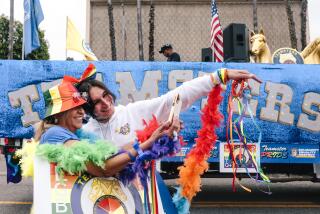2,000 Drivers Strike Film, TV Producers
- Share via
After a weekend of fruitless negotiations, more than 2,000 drivers went on strike Monday against film and television producers--the second major walkout to hit the entertainment industry this year.
The drivers, members of Teamsters Local 399, were joined by 500 electrical workers and 600 laborers whose unions also failed to reach a contract with the Alliance of Motion Picture and Television Producers.
“We’re going to put pickets at every gate at every studio,” said Earl Bush, chief negotiator and secretary-treasurer of Local 399. “Can we stop production? I guess that’s something we’ll have to wait to see.”
But unlike the strike by screenwriters--which ended in August after more than five months--producers said the latest walkout will not shut down the industry.
In a blow to the drivers, guilds representing Hollywood actors, directors and writers expressed verbal support for the strike but said their contracts prevent them from honoring picket lines. And for the last month, the major studios have prepared for the drivers’ walkout by running classified ads in local newspapers asking for non-union replacement drivers.
“We have made preparations for this walkout,” said Herb Steinberg, a spokesman for the producers’ alliance. “We’re going to continue to produce motion pictures and television programs. We’ve hired drivers and laborers and there will be no delays.”
The drivers’ duties include transporting heavy equipment and portable dressing rooms to and from sets, delivering messages and reels of film and chauffeuring actors and executives.
The decision to strike ended three months of sporadic talks between the unions and representatives of the producers’ alliance.
The producers sought wage freezes and pay cuts for drivers in certain classifications, including a demand that up to 200 limo, van and station wagon drivers accept a $2.61-per-hour cut in their current $16.61-per-hour wage. The producers argue that some concessions are needed if Hollywood’s unionized companies are to remain competitive with non-union and out-of-state producers.
“Since 1982, under the current contract, the driver’s pay has increased 45.3% while the Consumer Price Index has increased 22%,” Steinberg said. “What we’re talking about is bringing production costs in line.”
During weekend negotiations conducted under federal mediation, producers backed away from that demand, although there was dispute Monday about details of their latest proposal. Bush said the producers’ alliance asked for less drastic hourly reductions for some drivers and a three-year wage freeze for all others. Steinberg said the offer consisted of a three-year pay freeze for most drivers and small hourly increases for the others.
In any case, negotiations broke off at 1:45 a.m. Monday, nearly two hours after the midnight strike deadline set by the Teamsters last week.
At 3:50 a.m., in a hand-delivered letter to union negotiators, the producers’ alliance served notice that the current contract--ratified in 1985--was being terminated effective 4 a.m. Drivers who reported to several of the studios for work early Monday were turned away at the gate.
Trading Accusations
Each side accused the other of precipitating the work stoppage. The Teamsters said that despite their strike vote last week, they wished to continue talks but were stymied when the studios turned away drivers. The studios said they terminated the contract in response to the Teamsters’ strike vote and the breakdown in talks.
Drivers were joined in the strike by Laborers Local 724 and Electrical Workers Local 40.
“This is nothing but a tactic to break the union out of the movie business,” Bush told a press conference outside the office of Local 399 in North Hollywood, which is serving as strike headquarters. “We are asking the producers alliance to drop this lockout and get back to the bargaining table. If not, we must continue the strike.”
But the producers’ alliance countered that it was the Teamsters who on Friday voted overwhelmingly to strike.
“I got a call at home at 3:30 in the morning (Monday) from a CBS reporter in New York who said that Earl Bush was quoted as saying the Teamsters have gone out on strike,” Steinberg said. “That was before we delivered the letter. . . . They’re the ones who broke off the talks.”
Filming Delayed
At dawn, more than 100 Teamsters picketed at the Santa Monica Pier, where an episode of the NBC series “Hunter” was being filmed. Another picket line was set up outside the Hollywood offices of Stephen J. Cannell, who produces “Hunter” as well as “Sonny Spoon,” “Wise Guy” and “21 Jump Street.”
Santa Monica Police Sgt. John Hudson said that a few tires on equipment trucks were slashed early Monday morning. There were no witnesses.
As “Hunter” was being shot, several picketers banged on a dumpster, blew air horns and shouted “Cannell Unfair,” and “We want a contract.” Several others lining the driveway down to the pier clacked the wood handles on their signs against the railing.
Teamsters driver Paul Huggin, 34, parked his red Harley-Davidson and revved up the engine. He said he was forced to sell his house because of the writers’ strike, and now, “they put us in a hole and want us to back up more--and we won’t do it any more.”
Jerry Fleck, first assistant director, said filming was 2 1/2 hours behind schedule because of the strike.
Times staff writer Barbara Koh contributed to this story.
More to Read
The biggest entertainment stories
Get our big stories about Hollywood, film, television, music, arts, culture and more right in your inbox as soon as they publish.
You may occasionally receive promotional content from the Los Angeles Times.










